by Marcus Boston Jr. | Mar 8, 2024
The form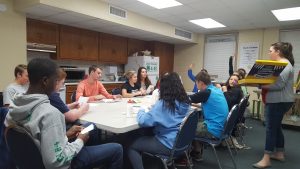 ulation of an effective camp counselor training program is crucial for ensuring a positive and enriching experience for both campers and counselors alike. The primary objective of any summer camp should be to recruit, train, and support competent counselors who can contribute to the overall enjoyment and success of the camp. Counselors play a pivotal role in shaping the camp experience, and their training is essential in achieving this goal.
ulation of an effective camp counselor training program is crucial for ensuring a positive and enriching experience for both campers and counselors alike. The primary objective of any summer camp should be to recruit, train, and support competent counselors who can contribute to the overall enjoyment and success of the camp. Counselors play a pivotal role in shaping the camp experience, and their training is essential in achieving this goal.
When designing a counselor training program, it is imperative to cater to various learning styles and preferences among participants. This includes accommodating visual, auditory, and kinesthetic learners by incorporating a diverse range of methods and activities into the training sessions.
Five key components of a successful 4-H camp counselor training program:
- Community Service: Initiating activities that allow counselors to engage in community service not only fosters a sense of social responsibility but also serves as an effective icebreaker, facilitating bonding among participants. (examples: gleaning citrus trees, sorting at food banks, assisting with clothing drives, etc.)
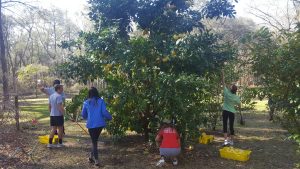
- Ice Breakers: Commencing each training session with ice breakers and team-building activities helps to create a cohesive and supportive atmosphere among counselors, setting a positive tone for the camp.
- Multimedia Presentations: Utilizing multimedia presentations comprising visuals and quotes can effectively highlight important concepts and enhance the learning experience for counselors.
- Hands-On Activities: Incorporating hands-on activities into the training program ensures active engagement and caters to the diverse learning styles of participants.
- Social Time: Allowing for social interactions and downtime during the training schedule enables counselors to build relationships and establish a sense of camaraderie, which is essential for effective teamwork during the camp session.
Additionally, facilitating structured discussions and reflection sessions after completing activities enables counselors to share their experiences, analyze their learning, relate it to real-life situations, and apply newfound knowledge to future scenarios.
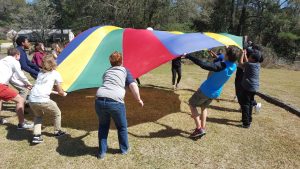 Furthermore, individuals interested in assuming leadership roles at the camp should undergo a selection process involving applications and interviews to ensure suitability for the position. This ensures that counselors align with the principles of Positive Youth Development, which is integral to the camp’s mission.
Furthermore, individuals interested in assuming leadership roles at the camp should undergo a selection process involving applications and interviews to ensure suitability for the position. This ensures that counselors align with the principles of Positive Youth Development, which is integral to the camp’s mission.
Source: Kentucky 4-H Counselor Training Guide
by Marcus Boston Jr. | Apr 26, 2023
Youth shows and fairs provide a valuable opportunity for young people to develop a wide range of life skills. From responsibility and communication to planning and organization, these events offer a unique learning experience that can help young people build important skills for success in all areas of life.
Can a youth’s participation in County fairs and Shows help to develop them into responsible adult? The answer is yes! The Florida 4-H Program seeks to be inclusive to all youth by using a variety of vehicles to teach youth life skills in traditional and non-traditional settings. A recent article in The Journal of Extension by Oregon State professionals found that “having fun” “spending time with friends” and “teamwork” were the highest-rated motivators for youth that participated in fairs.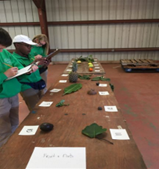
The study also revealed that participation in fairs through 4-H had a significant positive effect on participants’ levels of caring, contribution, and character. These characteristics are also part of the Essential Elements of 4-H that youth experience by being in an active 4-H program throughout the year. Those elements are Belonging, Independence, Generosity, and Mastery.
One of the most important skills that youth learn through participation in youth shows and fairs is responsibility. Whether they are caring for animals, plants, or other projects, youth must take on the responsibility of ensuring that their projects are healthy, well-cared for, and ready to be presented to judges and visitors.
 Communication is another key skill that youth develop through participation in youth shows and fairs. Through active participation youth learn the ability to articulate complex ideas, listen actively, and respond thoughtfully to questions and feedback.
Communication is another key skill that youth develop through participation in youth shows and fairs. Through active participation youth learn the ability to articulate complex ideas, listen actively, and respond thoughtfully to questions and feedback.
In addition to these skills, youth shows, and fairs also emphasize important values such as sportsmanship and fair play. Participants are encouraged to respect their competitors, accept both victories and defeats graciously, and uphold the highest standards of ethical behavior. This helps young people develop important social skills, including the ability to work collaboratively with others and build positive relationships.
Finally, participation in youth shows and fairs can help young people develop resilience and perseverance in the face of challenges and setbacks. These events can be competitive and stressful, but they also offer opportunities for young people to learn from failures, bounce back from disappointments, and remain motivated to achieve their goals.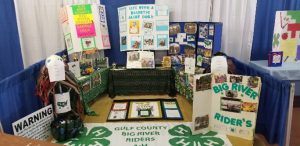
A few of the Florida 4-H Shows and Fairs are as follows:
-
- State 4-H Dairy Show Okeechobee March
- 4-H Chick Chain Show Chipley April
- Area North Horse Show Green Cove Springs May
- North Florida Fair Tallahassee November
*For additional opportunities to participate in 4-H Shows and fairs please contact your local 4-H office.
In conclusion, participation in youth shows and fairs can offer a unique and valuable learning experience for young people. By developing important skills such as responsibility, communication, planning, and organization, as well as important values such as sportsmanship and fair play, youth can build the foundation for success in all areas of life.
References:
More information on this study can be obtained by visiting the Journal of Extension at www.joe.org and viewing volume 45, number 6.(Arnold, Meinhold, Skubinna, and Asthton)
by Marcus Boston Jr. | Apr 13, 2023
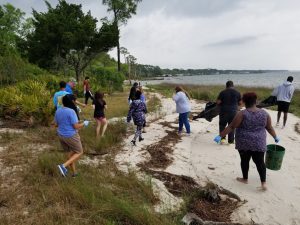 Life skills for youth are defined as a set of abilities and competencies that enable young people to successfully navigate their daily lives and achieve their goals. These skills are essential for personal and professional development and help “prepare youth to be responsible citizens and productive members of the workforce.” Florida 4-H provides many opportunities for young people to obtain life skills through project work, community and afterschool clubs, workshops, and leadership programs.
Life skills for youth are defined as a set of abilities and competencies that enable young people to successfully navigate their daily lives and achieve their goals. These skills are essential for personal and professional development and help “prepare youth to be responsible citizens and productive members of the workforce.” Florida 4-H provides many opportunities for young people to obtain life skills through project work, community and afterschool clubs, workshops, and leadership programs.
As a state-wide organization, Florida 4-H prioritizes the development of communication, higher-order thinking, and appreciation of differences. These three life skills are infused throughout our educational activities and programs because they are essential workforce skills. Below are a few examples of local programs that focus on helping youth develop life skills:
- Communication: 4-H provides opportunities for youth to develop their communication skills through the Florida 4-H Public Speaking Contest, demonstrations, and presentations at County/District and 4-H University. These activities help youth learn how to articulate their ideas clearly and confidently.
- Higher Order Thinking: this includes both decision-making and problem-solving.
- Decision-Making: 4-H offers various programs, such as judging contests at fairs, 4-H event planning committees (district/state council), and club activities that help youth develop their decision-making skills. These activities help youth learn how to make informed decisions and evaluate the outcomes of their choices.
- Problem-Solving: 4-H offers various programs, such as STEM projects and engineering challenges, that help youth develop problem-solving skills. These activities encourage youth to think creatively and find innovative solutions to complex problems.
- Appreciation of Differences– 4-H helps youth learn how to respect and communicate with people who might be different from themselves. Many of our programs offer opportunities for youth to meet new people and explore different cultures. We also help youth learn how to address conflict in a positive way through civil discourse. Older youth can participate in exchange programs with 4-Hers from other states and countries (4-H is in all 50 states and 32 other countries!).
- Teamwork: Through 4-H club projects, counselor training, and community service activities, youth learn how to work collaboratively with others towards a common goal, which helps them develop important teamwork skills.
- Responsibility: 4-H club projects and community service activities encourage youth to take responsibility for their actions and to learn the importance of following through on commitments.
- Leadership Development: 4-H offers various programs, such as officer training, public speaking, county/district councils, and community service projects, that help youth develop their leadership skills.
- Self-Confidence: 4-H programs provide a safe and supportive environment where youth can build their self-confidence through public speaking, leadership roles, and community service activities.
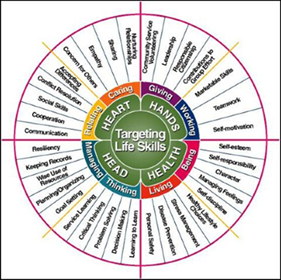
- Service Learning: Through 4-H club work, obtaining a Florida 4-H Community Pride Grant, and active membership on county/district councils, youth members take part in projects and experiences that help them how to become active participants in the communities and apply their experiences to real-life situations.
These are not the only life skills youth in Florida can learn and practice through 4-H- but they are part of almost every program we offer. These are examples of the priority life skills that Florida 4-H promotes among youth, with a focus on cognitive development, interpersonal skills, leadership, civic engagement, and practical skills. Florida 4-H aims to provide a comprehensive youth development program that equips young people with the skills they need to succeed in their personal lives, careers, and communities. Active involvement in 4-H will help members to connect life skills obtained through their 4-H involvement to real-life experiences. For more information on these youth leadership opportunities please contact your local 4-H office.
If you would like to help Florida 4-H teach life skills, or get your child involved in our program, reach out to your local UF/IFAS County Extension Office. There is an office in every county in Florida. Spring is a great time to get involved, because 4-H offers several summer programs for youth to develop life skills!
References:
Marilyn N. Norman and Joy C. Jordan.2018.Targeting Life Skills. EDIS document #4HSFS101.9
Hendricks, P.(1988). Developing Youth Curriculum Using The targeting Life Skills Model
Michigan State Extension. 2016. 4-H Head Life Skill Sheets.(4-H1679)
by Marcus Boston Jr. | Feb 4, 2022
My name is Marcus Boston and I’m the County Extension Director and 4-H Youth Development Agent in Leon County, Tallahassee FL. I’m originally from Gainesville Florida and have worked for the Leon County Extension Service as a 4-H Extension Agent, for 29 years.
I was born and raised in Gainesville FL., the location of the State 4-H office but was never involved in 4-H as a youth. I graduated from Buchholz High School in Gainesville Florida and earned a football scholarship to attend school and play football for Florida A&M University (FAMU) in Tallahassee. As a result of my accomplishments on and off the team, during my senior year, I was awarded the prestigious Alonzo Smith “Jake Gaither” Award. I completed my B.S. degree in Agribusiness and while working as a graduate assistant coach on the football team, I completed my M.S. in Agricultural Sciences. Prior to starting graduate school, I worked as a Sideline Commentator for the Florida A&M football games that were aired on a local radio station. After completing graduate school, I began my professional career as an extension agent with Florida A&M University and the University of Florida working primarily with 4-H Youth Development.
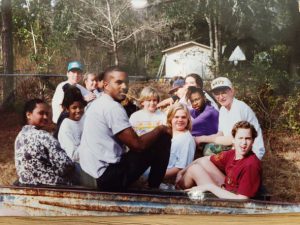
Marcus joins Leon County 4-H Leadership Club fun day activity in the early 90’s
When I started in Leon County one of my first assignments was to make a personal visit to all the existing 4-H clubs in the county at that time. After meeting all the wonderful volunteers and youth involved in our Leon County 4-H program, I was inspired by all the fun educational projects the youth were involved in and encouraged by the commitment and passion of the volunteers that oversaw the clubs. It is this commitment and passion that still exist today and that encouraged me to work extra hard to recruit and train volunteers so there could be more clubs for youth to join.
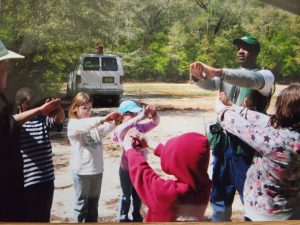
Marcus Boston teaching youth how to determine which eye is dominant before archery class
The establishment of my Environmental Education/Stewardship Program is one of my most successful programs here in Leon County. This program includes a series of smaller programs developed and carried out with the primary objective of educating our youth about the importance of conserving, protecting, and appreciating our environment and how they can become environmental stewards in their respective community’s. These experiences are tailored to equip youth participants with the information they need that will help them make logical decisions on environmental issues that may arise as they enter adulthood. In a few years these youth could be accountable for attitudes, perceptions and policies that affect our environment as well as our soil. A few of the environmental focused experiences that I developed and carried out during past several years as part of our Leon County 4-H program are: 4-H Ecology Field Day, 4-H Eco-ventures Spring Break Camp, Wild About Water Day Camp, The Talking Trash Day Camp, Going Green Day Camp, No Woods Left Behind Day Camp, Trees and Bows Day Camp, 4-H Wildlife and Outdoor Recreation Camp at Jubilee, and residential camp at 4-H Camp Cherry Lake held in Madison FL.
As a certified archery and canoe instructor, I’ve had the pleasure of teaching thousands of youth communications and safety skills using a canoe and a bow and arrow as the vehicle of choice. Both of which I’m still involved to this day. In an effort help young people learn the life cycle, I have taught the 4-H Embryology program in several schools in Leon County. This program has provided the opportunity for hundreds of students and teachers, to watch chicks hatch out of their eggs right before their eyes in their classroom…an experience they never forget.
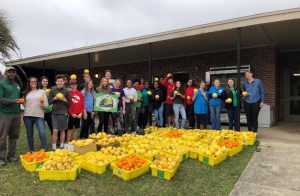
Leon County 4-H Camp Counselors kickoff counselor training with gleaning 1,300 lbs. of fruit to provide for homeless shelter
The Leon County 4-H Camp Counselor Training Program has also served as one of my most successful teen leadership programs. I have enjoyed recruiting, training and equipping hundreds of teens with the skills and knowledge they need to: Manage campers at our residential camp, understand the “ages and stages” of the youth they supervised, apply strategies for teaching classes at camp, and most important, keeping camp safe for all in attendance. Due to the success of this program, former counselors from our counselor training program are viewed and recruited as potential camp staff for our State 4-H camps each year.
I have also enjoyed providing opportunities for thousands of youth in Leon County Schools to participate in The 4-H Tropicana Public Speaking Program (now known as the Florida 4-H Public Speaking Program sponsored by Florida Power and Light) which annually provides an opportunity for over 7,000 Leon County 4th, 5th, and 6th graders to develop, write, and present a speech on a topic of their interest. With so much emphasis on texting and posting…this program continues to provide a platform for young people to develop their oral communication skills which is crucial as they graduate and enter the work force.
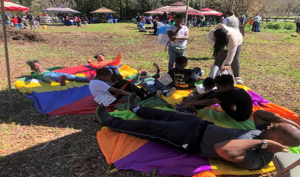
Marcus Boston is demonstrating fitness techniques with attendees during Youth Extension Day in Leon County.
I have also been a Project Learning Tree(PLT) facilitator for over 20 years and have help to train over 500 college students from Florida State, Flagler College and Florida A&M University in how to teach youth environmental education using the PLT curriculum.
The last six years as County Extension Director has provided me an opportunity to promote UF/IFAS Extension by managing and working with my faculty in providing researched based information in the form of workshops, field days, 4-H clubs, seminars, virtual and hybrid webinars and school enrichment programs in an effort to help youth and adults in the Leon County Community find the Solutions For Their Life. I have always believed that active participation in 4-H provides youth the tools in life to be successful in whatever direction they choose to go.
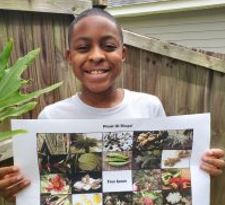
by Marcus Boston Jr. | Jul 31, 2020
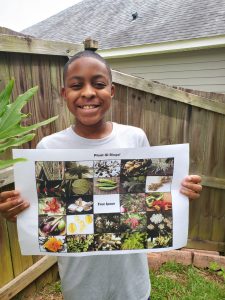
4-H Virtual Plant Science Camp Bingo Game
July 6th of this year was supposed to be the first day of our 4-H Wildlife and Outdoor Recreation Day Camp with Leon and Jefferson Counties participating. Due to the pandemic, all of our Florida 4-H face to face camps were cancelled this summer due to safety concerns for the students and the instructors.
In spite of everything that has taken place since March of this year, there is still some good news! Even though we are in the middle of a pandemic, there is an outdoor classroom in YOUR backyard that has plenty of room for young people and parents to explore. While most youth have spent more time than they probably want to with their families confined, within the four walls of their home, there is no time like the present to explore wildlife and gardening opportunities that await just outside the door. Youth that spend time outside exploring the great outdoors have the unique opportunity to stimulate their senses while engaging in “hands on” educational activities without even knowing it.
4-H provides countless opportunities for youth to gain a better understanding of how all organisms are interrelated and how they can become environmental stewards at home, school, and in the communities in which they live. What are some of the benefits of converting backyards to outdoor classrooms?
I’m glad you asked…here are just a few!
1. Healthy lifestyles are encouraged –
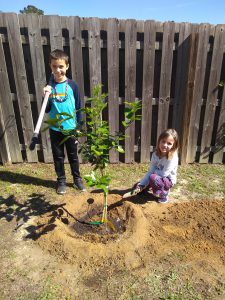
Youth planting an orange tree after participating in Virtual Plant Science Camp
Active time spent outside may help address some of the health issues we are seeing in children today such as obesity, attention deficit disorders, and depression.
2. Nature deficit disorder decline –
Exposing students to nature and allowing them to learn and play outside has shown to foster sensitivity, appreciation, and respect for the environment. It combats “nature deficit disorder” …and it can be a lot of FUN!
3. Critical-thinking skills enhanced –
Exploring what is in the backyard and starting a garden provides opportunities for experiential learning outside of the classroom and enables students to make connections that can be applied to the real world.
4. Responsible action is taken to better the environment –
By exploring outdoors either by planting or just observing nature, youth begin to understand how their decisions and actions affect the environment. It is from this point they can begin to obtain the skills necessary to address complex environmental issues as well as ways we can take action to keep our environment healthy and sustainable for the future.
So even though we are in the midst of a pandemic, there may be opportunities to make lemonade out of the COVID-19 lemons we find ourselves in by unmasking the opportunities that await in our backyards!
For more information about 4-H in your county, find your local UF/IFAS Extension office or visit http://florida4h.org.
*“Please note some pictures were taken prior to our challenges with Covid-19 and we remind people to social distance and wear a mask for the personal safety of self and others.”
 ulation of an effective camp counselor training program is crucial for ensuring a positive and enriching experience for both campers and counselors alike. The primary objective of any summer camp should be to recruit, train, and support competent counselors who can contribute to the overall enjoyment and success of the camp. Counselors play a pivotal role in shaping the camp experience, and their training is essential in achieving this goal.
ulation of an effective camp counselor training program is crucial for ensuring a positive and enriching experience for both campers and counselors alike. The primary objective of any summer camp should be to recruit, train, and support competent counselors who can contribute to the overall enjoyment and success of the camp. Counselors play a pivotal role in shaping the camp experience, and their training is essential in achieving this goal.
 Furthermore, individuals interested in assuming leadership roles at the camp should undergo a selection process involving applications and interviews to ensure suitability for the position. This ensures that counselors align with the principles of Positive Youth Development, which is integral to the camp’s mission.
Furthermore, individuals interested in assuming leadership roles at the camp should undergo a selection process involving applications and interviews to ensure suitability for the position. This ensures that counselors align with the principles of Positive Youth Development, which is integral to the camp’s mission.











